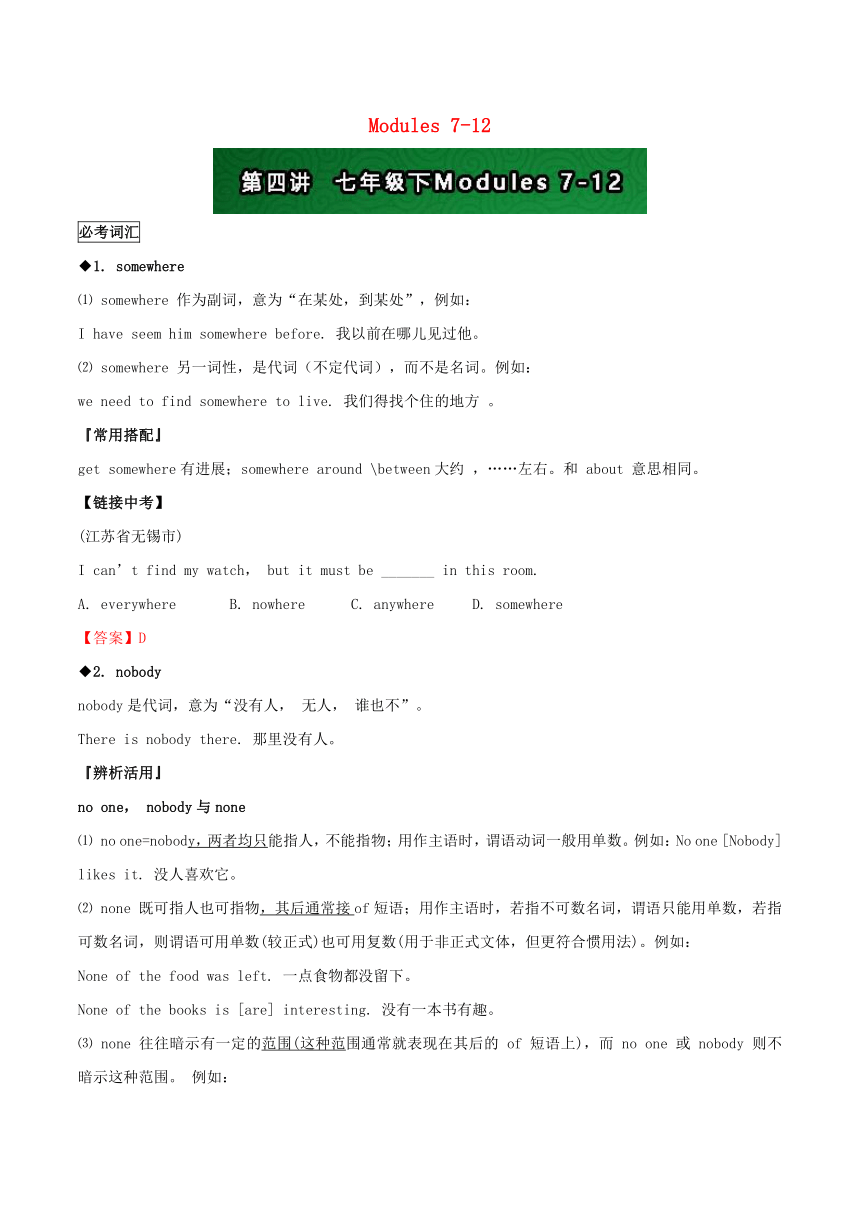
Modules 7-12 必考词汇 ◆1. somewhere ⑴ somewhere 作为副词,意为“在某处,到某处”,例如: I have seem him somewhere before. 我以前在哪儿见过他。 ⑵ somewhere 另一词性,是代词(不定代词),而不是名词。例如: we need to find somewhere to live. 我们得找个住的地方 。 『常用搭配』 get somewhere有进展;somewhere around \between大约 ,……左右。和 about 意思相同。 【链接中考】 (江苏省无锡市) I can’t find my watch, but it must be _____ in this room. A. everywhere B. nowhere C. anywhere D. somewhere 【答案】D ◆2. nobody nobody是代词,意为“没有人, 无人, 谁也不”。 There is nobody there. 那里没有人。 『辨析活用』 no one, nobody与none ⑴ no one=nobody,两者均只 出卷网能指人,不能指物;用作主语时,谓语动词一般用单数。例如:No one [Nobody] likes it. 没人喜欢它。 ⑵ none 既可指人也可指物,其后通常接 出卷网of短语;用作主语时,若指不可数名词,谓语只能用单数,若指可数名词,则谓语可用单数(较正式)也可用复数(用于非正式文体,但更符合惯用法)。例如: None of the food was left. 一点食物都没留下。 None of the books is [are] interesting. 没有一本书有趣。 ⑶ none 往往暗示有一定的范围(这种范 出卷网围通常就表现在其后的 of 短语上),而 no one 或 nobody 则不暗示这种范围。 例如: A: Did any of your friends come to see you 你的朋友当中有谁来看过你吗 B: None. 一个也没来。 A: Did anyone come to see you 有人来看过你吗 B: No one [Nobody]. 谁也没来(from 21世纪教育网 yywords. com)。 ◇none 有时暗示一种数 出卷网量,即指数量上“一个也没有”,而 no one 或 nobody 则往往表示一种全面否定,即指“谁都没有”,所以在回答 how many 或 how much 的提问时,通常用 none,而在回答 who 的提问时,通常用 no one 或 nobody。例如: ①—How many English books have you read 你读过多少本英文书 —None. 一本也没读。 ②—Who went to see the film 谁去看电影了 —No one [Nobody]. 谁也没去。 【链接中考】 (湖南长沙) 1. — Who helped you clean the classroom yesterday — _____. I cleaned it all by myself. A. Somebody B. Nobody C. Everybody 【答案】B (江苏省苏州市) 2. — Wow! You’ve got so many skirts. —But _____ of them are in fashion now. A. all B. both C. neither D. none 【答案】D (湖北省武汉市) 3. — How many students are there in the classroom —_____. They are all in the lab. A. Some B. None C. All D. Neither 【答案】B ◆3. all all修饰名词主语时,可放在主语或行为动词之前,但要放在be动词之后。当be动词是句中最后一个词时,all要放在动词之前。例如: All the boys study well The boys all study well 孩子们都学习得很好。 —Are you young pioneers 你们是少先队员吗? —Yes, we all are. 是的,我们都是少先队员。 『辨析活用』all和both 表示“全体”,可用all和both,但all表示三个或三个以上的人或物的“全体”,而both则表示两个人或物的“全体”。例如: All the five students are from the USA. 五个学生都来自美国。 Both the two girls are pretty. 两个女孩都长得漂亮。 『常用搭配』 ⑴ all of 实足(后面如果加代词,代词前面不需要修饰词)例如: All of them like disco dance. 他们都喜欢迪斯科舞。 ⑵ all与not连用通常表示“部分否定”。例如: All my friends cannot swim. 我所有的朋友并不都会游泳。 I don’t know all of them. 我并不都认识他 ... ...
~~ 您好,已阅读到文档的结尾了 ~~